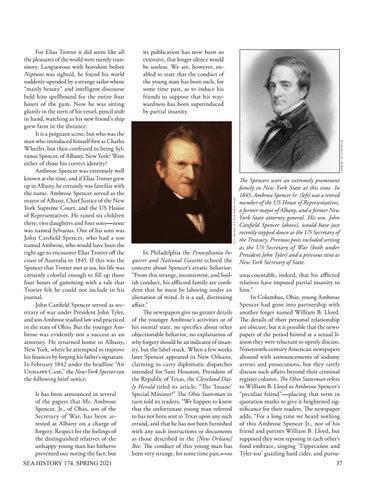It has been announced in several of the papers that Mr. Ambrose Spencer, Jr., of Ohio, son of the Secretary of War, has been arrested at Albany on a charge of forgery. Respect for the feelings of the distinguished relatives of the unhappy young man has hitherto prevented our noting the fact; but
library of congress
its publication has now been so extensive, that longer silence would be useless. We are, however, enabled to state that the conduct of the young man has been such, for some time past, as to induce his friends to suppose that his waywardness has been superinduced by partial insanity.
p.d. image via wikipedia.com
For Elias Trotter it did seem like all the pleasures of the world were merely transitory. Languorous with boredom before Neptune was sighted, he found his world suddenly upended by a strange sailor whose “manly beauty” and intelligent discourse held him spellbound for the entire four hours of the gam. Now he was sitting glumly in the stern of his vessel, pencil stub in hand, watching as his new friend’s ship grew faint in the distance. It is a poignant scene, but who was the man who introduced himself first as Charles Wheeler, but then confessed to being Sylvanus Spencer, of Albany, New York? Were either of those his correct identity? Ambrose Spencer was extremely well known at the time, and if Elias Trotter grew up in Albany, he certainly was familiar with the name. Ambrose Spencer served as the mayor of Albany, Chief Justice of the New York Supreme Court, and the US House of Representatives. He raised six children there, two daughters and four sons—none was named Sylvanus. One of his sons was John Canfield Spencer, who had a son named Ambrose, who would have been the right age to encounter Elias Trotter off the coast of Australia in 1845. If this was the Spencer that Trotter met at sea, his life was certainly colorful enough to fill up those four hours of gamming with a tale that Trotter felt he could not include in his journal. John Canfield Spencer served as secretary of war under President John Tyler, and son Ambrose studied law and practiced in the state of Ohio. But the younger Ambrose was evidently not a success as an attorney. He returned home to Albany, New York, where he attempted to improve his finances by forging his father’s signature. In February 1842 under the headline “An Unhappy Case,” the New-York Spector ran the following brief notice:
In Philadelphia the Pennsylvania Inquirer and National Gazette echoed the concern about Spencer’s erratic behavior: “From this strange, inconsistent, and foolish conduct, his afflicted family are confident that he must be laboring under an alienation of mind. It is a sad, distressing affair.” The newspapers give no greater details of the younger Ambrose’s activities or of his mental state, no specifics about other objectionable behavior, no explanation of why forgery should be an indicator of insanity, but the label stuck. When a few weeks later Spencer appeared in New Orleans, claiming to carry diplomatic dispatches intended for Sam Houston, President of the Republic of Texas, the Cleveland Daily Herald titled its article, “The ‘Insane’ Special Minister!” The Ohio Statesman in turn told its readers, “We happen to know that the unfortunate young man referred to has not been sent to Texas upon any such errand, and that he has not been furnished with any such instructions or documents as those described in the [New Orleans] Bee. The conduct of this young man has been very strange, for some time past,—so
The Spencers were an extremely prominent family in New York State at this time. In 1845, Ambrose Spencer Sr. (left) was a retired member of the US House of Representatives, a former mayor of Albany, and a former New York State attorney general. His son, John Canfield Spencer (above), would have just recently stepped down as the US Secretary of the Treasury. Previous posts included serving as the US Secretary of War (both under President John Tyler) and a previous stint as New York Secretary of State. unaccountable, indeed, that his afflicted relatives have imputed partial insanity to him.” In Columbus, Ohio, young Ambrose Spencer had gone into partnership with another forger named William B. Lloyd. The details of their personal relationship are obscure, but it is possible that the newspapers of the period hinted at a sexual liaison they were reluctant to openly discuss. Nineteenth-century American newspapers abound with announcements of sodomy arrests and prosecutions, but they rarely discuss such affairs beyond their criminal register column. The Ohio Statesman refers to William B. Lloyd as Ambrose Spencer’s “peculiar friend”—placing that term in quotation marks to give it heightened significance for their readers. The newspaper adds, “For a long time we heard nothing of this Ambrose Spencer Jr., nor of his friend and partner William B. Lloyd, but supposed they were reposing in each other’s fond embrace, singing ‘Tippecanoe and Tyler too’ guzzling hard cider, and pursu-
SEA HISTORY 174, SPRING 2021 37
